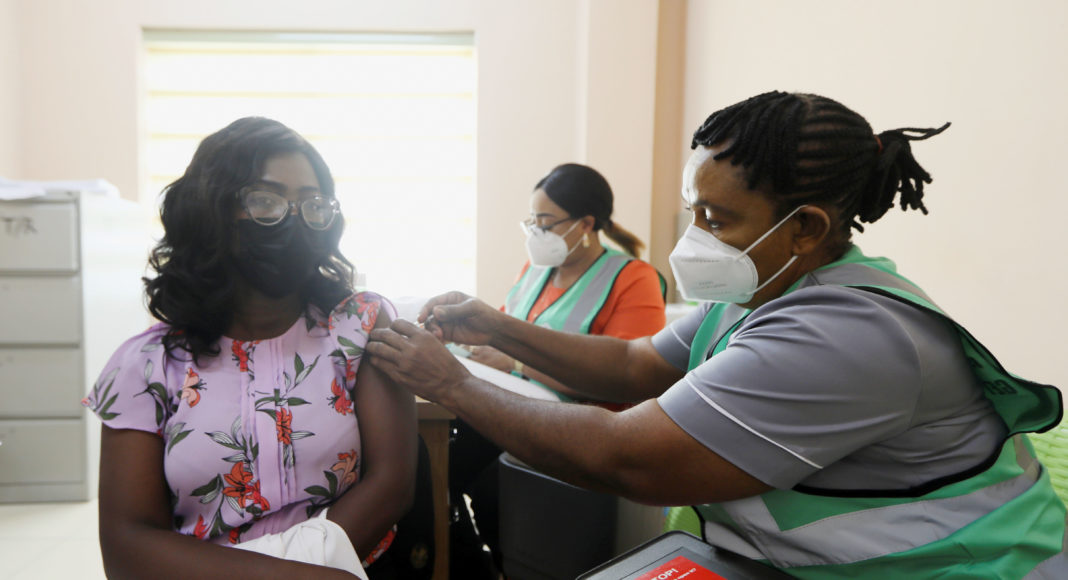By Dounard Bondo
A major union of Nigerian public medical professionals declared an indefinite strike starting Thursday, April 1st, as the Covid-19 pandemic wages on and the country continues its vaccine rollout. In its official statement, the Nigerian Association of Resident Doctors (NARD) cited a lack of pay for three months, an urgent need to increase hazard pay for doctors on the front lines, the provision of death in service insurance benefits, and other claims.
NARD president Dr. Uyilawa Ikhuaihesuyi explained in a TV interview that the association is proceeding with an indefinite strike because the government has failed to resolve key issues that were discussed in past years. Previously, he said, NARD had stopped planned strike actions after the government made promises with regards to pay, PPE, and provisions of better facilities, but some of those promises were not respected. He also underlined the doctors’ patriotic and understanding nature.
House officers in some medical centers like Federal Medical Centre, Keffi, and University College Hospital, Ibadan, were already strike when the NARD strike was called. Dr. Egbiri Joy, a medical house officer at the FMC Keffi, was already part of a house officer “sit-at-home protest” over wages on Monday. She joined the NARD strike on Thursday and said, “even though we work long hours, I still haven’t been paid for 3 months,” arguing that working conditions are unacceptably poor.
“Before, salaries were 195,000 naira plus taxes. But they centralized payments, salaries now stand at 172,000 naira with deductions for house rents being made centrally, even though not all house officers live in the hospital quarters across the country,” Joy explained.
The Nigerian healthcare system is understaffed and underfunded. In 2021, Nigeria 13 trillion-naira national budget allotted only 656 billion naira to meet the health needs of its estimated 198 million people.
Nigerian doctors are underpaid, and the current hazard allowance of medical doctors stands at 5,000 naira, which is around 12 dollars. This is despite long working hours, and the fact that doctors are exposed to Covid-19 and other diseases like Lassa fever. Even though there is a death in service insurance scheme, the national association of resident doctors says they lost 17 of its members in service and their families still haven’t received benefits.
It’s unlikely that the strike will have an impact on Nigeria’s Covid-19 vaccination campaign because nurses or non-resident doctors can still administer the vaccine in state hospitals.
According to the Nigeria medical association in 2019, there are only 40,000 doctors to Nigeria’s entire population, a far cry from the WHO recommended ratio of one doctor to 600 patients. Medical centers are also lacking in adequate equipment and facilities.
According to The Guardian, Nigeria loses around 576 billion naira ($1.2 billion) to medical tourism. And even though the present government claimed they would address medical tourism during campaigns in 2015. Nigerian President Muhammadu Buhari continued taking his regular medical trips abroad when he took office in 2015. In 2017, Buhari stayed in the United Kingdom for over 100 consecutive days on an undisclosed health issue.
The president is currently out of the country after leaving for a medical check-up two days before the commencement of the resident doctor strike for non-payment of salaries. He left despite the fact that N17.3 billion naira was allotted to the state hospital (the hospital for the presidency) in the 2021 budget.
In Nigeria’s case, it’s not just the patients who are leaving. A considerable amount of doctors are emigrating from the country, with most ending up in the USA, Britain, Canada, the United Arab Emirates and South Africa. At least 8,178 medical workers from Nigeria work in the UK, according to the UK General Medical Council. With the global pandemic straining their health systems, countries like the United Kingdom and Canada have made it easier for medical professionals to immigrate.
NARD has stated that the association is still in talks with the government to resolve their concerns. For many Nigerians suffering during the pandemic, the resolution to the standoff cannot come soon enough.


